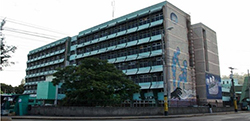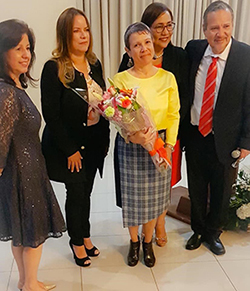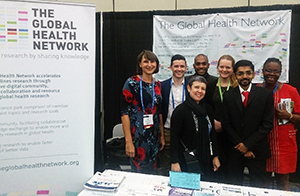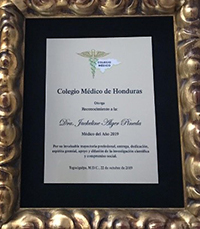Jackeline Alger is a remarkable woman. From clinician to conducting laboratory and field work on parasitic diseases such as malaria, Chagas disease and other infectious diseases (and more recently, studying the impact of Zika and COVID-19 on pregnancy), she remains passionate about health research, teaching and capacity building. Health inequity, particularly in Honduras, is at the forefront of all that she does – a fact that led to her receiving prestigious recognition as Honduras Physician of the Year in 2019.
 Jackeline at ASTMH meeting in Baltimore in 2017 | "In Honduras everything is difficult. Everything. When you have a group with whom you can work and contribute, it is a real achievement.” It is this positive attitude, determination, the ability to work with the right people, and the willingness to work collaboratively and network with others that has shaped Jackeline’s career. Jackeline grew up in San Pedro Sula – the second largest city in Honduras, situated on its Northern Coast. She is the youngest of eight brothers and sisters. Where others may have lost their way in a large family, Jackeline, a studious child, had quiet ambition. Even as a young girl, she knew she wanted to become a doctor, spurred on by wanting to be like her older sister, Mucia. That desire was supported by her father (a worker at regional offices in the agriculture ministry), mother (a housewife) and her siblings, who sustained her in her move to Tegucigalpa, the capital city, so that she could attend medical school at the Universidad Nacional Autónoma de Honduras (UNAH). |
An early start in research
It was while studying for her medical degree that Jackeline got her first taste of research, working on medicinal plants as a research assistant with the Dr Pablo J. Cambar laboratory at UNAH. Her first research publications (in the Revista Médica Hondureña) were done then.
She also met the scientist that she still looks on as a mentor – parasitologist Rina Kaminsky. With funding from the university for her thesis, Jackeline embarked on a project in Rina’s group studying intestinal protozoan parasites. For this she had to interview parents of small children, which reminded her about health poverty and inequity in Honduras. After completing her medical degree in 1986 and with Rina´s support, she prepared to undertake postgraduate studies in parasitology under a Fulbright Scholarship. |  |
Training and TDR
In 1992, success in her Master’s degree at the Tulane University School of Public Health and Tropical Medicine in New Orleans led to the offer of undertaking a PhD with a Paul C. Beaver Scholarship. While Honduras might have been the natural choice for field work for her PhD, the infrastructure was too weak and field work was deemed risky. Instead, she did her field work in Colombia.
She received a TDR training grant (1994–1997) for her research on Plasmodium vivax (which she did under Donald J. Krogstad and Nancy Saravia, at CIDEIM, Cali) and later a re-entry grant (1998–2000) for malaria work in Honduras.
It was while in Colombia that she came across Centro Internacional de Entrenamiento e Investigaciones Médicas (CIDEIM) – a research institute with strong ties both to Tulane and TDR that Jackeline views as a model set-up. This, no doubt, helped inspire her in her later work on capacity building. (CIDEIM has been a Regional Training Centre for TDR since the 1990s.)
The clinic, the field, the lab and the lecture hall
Jackeline has continued to be an active clinician, researcher and teacher/trainer/mentor.
After being awarded her PhD in 1997, Jackeline returned to Honduras. There, she got a job as a parasitologist in the Department of Clinical Laboratory of the University Hospital, working alongside Rina. Again, side-by-side with her benchwork, Jackeline
was seeing patients and assisting clinical staff in laboratory diagnosis and management of patients with parasitic infections. She also started teaching on a voluntary modality at the UNAH clinical postgraduate programmes.
 Jackeline in a malaria training course Jackeline in a malaria training courseat the University Hospital Credit: J. Alger | In 2008, Jackeline’s career took another turn as she joined the Scientific Research Unit of the Faculty of Medical Sciences, UNAH as part-time faculty member. She had kept in touch with CIDEIM; Jackeline and her faculty fellows view
this unit as a CIDEIM counterpart. |
Jackeline trained as EPPE trainer. She became very active at the Regional Training Centre Network in Latin America and the Caribbean (in EPPE, Good Health Research Practices, Implementation Research). In turn she trained others. Sadly, however, all plans for the unit came to a halt in 2009 following the coup d'état in Honduras. The work didn’t then recover until 2013. “Four years in our academic life were practically lost,” says Jackeline with some sadness. But, more positively, she adds “We are [now] leaders in Central America because we have trained professionals from Guatemala, Cuba, El Salvador, Costa Rica. I have trained many in Honduras. I have also trained in Colombia, Surinam and Tunisia.”
Jackeline remains a part-time Faculty member at the Unit, and is also a full-time Parasitologist in the Department of Clinical Laboratory at the University Hospital in Tegucigalpa, the main public health hospital in Honduras. Jackeline is also a member of the Instituto de Enfermedades Infecciosas y Parasitologia Antonio Vidal (IAV) board, which is a non-profit organization devoted to training, advising, and conducting research in the field of infectious diseases with strategic allies such as Tulane University, New Orleans, Louisiana (Dr Pierre Buekens); Instituto the Efectividad Clinica y Sanitaria (IECS), Buenos Aires, Argentina (Dr Maria Luisa Cafferata), The Global Health Network, and PAHO/WHO.
A current research project with the Instituto Antonio Vidal and Tulane University is a cohort study on Zika in pregnancy in Honduras (ZIPH) that started at the peak of Zika epidemics in Honduras in 2016; up to now it has enrolled over 4000 pregnant women. Jackeline and her colleagues are currently exploring ways to incorporate a COVID-19 component to the cohort.
Mentoring has remained important to her throughout. “Being a mentor has pulled the best out of me,” she enthuses. “I really enjoy contributing to [the career of] others…I was even a semi-finalist for the Americas region for a proposal I submitted to a TDR Global Research Mentorship Challenge Contest”.
Keeping “active”
 Jackeline and members of the Honduran Medical College Board of Directors at the awards event in Honduras. Credit: J. Alger | I like to always keep active,” says Jackeline – a fact that is reflected in her many other roles. She also serves as an Adjunct Associate Professor at the Tulane University School of Public Health and Tropical Medicine
(SPHTM), is a member of the Editorial Board of the Revista Médica Hondureña since 1998 (current director since 2019), and the Advisory Committee of the Honduras Virtual Health Library, National Medical Library, Library
System, UNAH (its coordinator since 2011). |
Facing challenges
Jackeline’s career progress and standing is a credit to her and a testament to how highly respected she is. But it hasn’t all been plain sailing. At medical school she relied on the support of her family to look after her son. While completing her postgraduate studies, her husband and his two children joined the family – meaning she was suddenly juggling career and motherhood.
Living and working in Honduras has had many other challenges, some of which others may take for granted. “Simple things like the internet, or having a photocopier, haven’t always been available as now. I remember having to go elsewhere to check emails,” she says.
Working in the field also exposed her to civil wars in Central America and in Colombia. In her last year as a medical student she was posted on the border with El Salvador. Salvadorian migrants arrived through that border and would go on to join the refugee camp at Mesa Grande village with help from the United Nations High Commissioner for Refugees (UNHCR). However, many would not make it; from time-to-time she would hear the airplanes and shooting.
While doing her field work in Colombia, she visited areas in conflict including Caqueta and Vaupez. She recalls having to run and hide in the house of friends after hearing shooting one time. It was the following morning that they learned about the fighting between the army and guerrillas. This experience gave Jackeline empathy for those living in such circumstances: “People in those places had to endure those attacks frequently, being harmed in different ways, physically, emotionally, socially,” she says.
As is the case for many women scientists, she has also faced personal battles. There have been many people over the years that have challenged her or been less accepting of her. She is always given a “funny look”, she says, when she introduces herself as a “médica” or “científica” instead of the more commonly used, masculine, “médico” or “científico”. But having two strong, female mentors (Rina and Nancy) has helped. “We had to fight,” she says, adding “but now, thankfully, attitudes are changing, and I really try to work hard with everybody!”
Despite overcoming barriers in her own life and career, Jackeline is well aware of gender imbalance in terms of health outcomes. “In Honduras, for instance, many women work in factory-like maquilas. Often,” she says, “they have poor pay, child care issues, and work in overcrowded conditions. All of these affect a woman’s health”.
Not “The more, the merrier”
There have been other challenges too. For instance, the three institutions with which she has close links (The Honduras Society for Infectious Diseases, Instituto de Enfermedades Infecciosas y Parasitologia Antonio Vidal and The Association for the Honduran Parasitology) are all involved with infectious and parasitic diseases. Yet they were set up separately with different funding mechanisms and serving different groups, so teamwork and communications among them has at times been difficult. She feels a simpler, single organization would help Honduras deal with health challenges such as the current one being posed by COVID-19, where a harmonized clinical and epidemiologic approach is currently lacking.
Global networking“Institutions in Honduras have many gaps in their research processes, so capacity building is a must,” says Jackeline. Her vision for Honduras is “a country where research is part of the solution”. To this end she believes in the power of networks, collaborations and learning from others. |
|
As well as staying part of the network of the TDR Regional Training Centre for Latin America and the Caribbean (CIDEIM, Cali, Colombia), her mentoring strategy has included building close ties with The Global Health Network (TGHN) and the global health information campaign Healthcare Information for All (HIFA). They, in turn value her efforts – in both 2015 and 2018, Jackeline was honoured as HIFA Country Representative of the Year and, in other years since joining, she has been awarded a special commendation.
Jackeline is awarded Honduras Physician of the Year in 2019
| This award, conferred by the Honduran Medical College (Colegio Médico de Honduras), recognizes dedicated physicians favouring the health of
the Honduran population. Thirteen physicians have been awarded since its creation in 2002; Jackeline was the second woman to receive it – an honour that “filled her with joy” and that she recognizes she received
thanks to the support of a large number of colleagues and other professional and technical health staff. The award was a fitting tribute to someone so passionate about health in her country. |
Ongoing links with WHO and TDR
Since 2010 Jackeline has been a member of the Pan American Health Organization (PAHO)/ World Health Organization (WHO) Advisory Committee on Health Research (ACHR).
She has also worked on Zika and reproductive health with HRP (the UNDP/UNFPA/UNICEF/WHO/World Bank Special Programme of Research, Development and Research Training in Human Reproduction which, like TDR, is based at WHO headquarters in Geneva) and upon calls from PAHO Honduras participates in meetings on topics including malaria, Chagas disease, leishmaniasis, and snake bite.
Jackeline also continues to have close ties with TDR. She is a member of the TDR Regional Training Centre for LAC (Latin America and the Caribbean) and is a member of the SIHI LAC hub. Most recently, she took on the role as lead for SIHI Honduras, the social innovation in health hub based at UNAH. “Social innovation for health seems a very feasible answer to some health problems and their approach and solution in countries such as Honduras,” she says, adding “at UNAH we are very excited about moving forward our plan to identify collaborators at UNAH, faculties other than health sciences, from outside UNAH and in the second year, reach out Central America.”
I am grateful for TDR support; with that support I have been able to experience collaborative regional and global work, making a significant impact on my career and what I've been able to do.
A final thought
When asked about her greatest passion, Jackeline responds “Maybe everything I do is around capacity building. Research, training, mentoring is about capacity building.” As for any proud teacher, it makes Jackeline very pleased to see students she has taught in high levels posts – “I know they recognize the support that I, or my institution gave them”.
She, too, remembers those that have helped her in her career and is especially thankful to her family. She is still in touch with Pablo J. Cambar and is actively collaborating with Nancy Saravia and Pierre Buekens. It is her relationship with her parasitology mentor, Rina Kaminsky, that remains closest. Through the worries of the current COVID-19 health crisis the two women have continued their mutual support; they have an unspoken understanding – with each touching base on a daily basis.
To contact Jackeline Alger, email: jackelinealger@gmail.com



